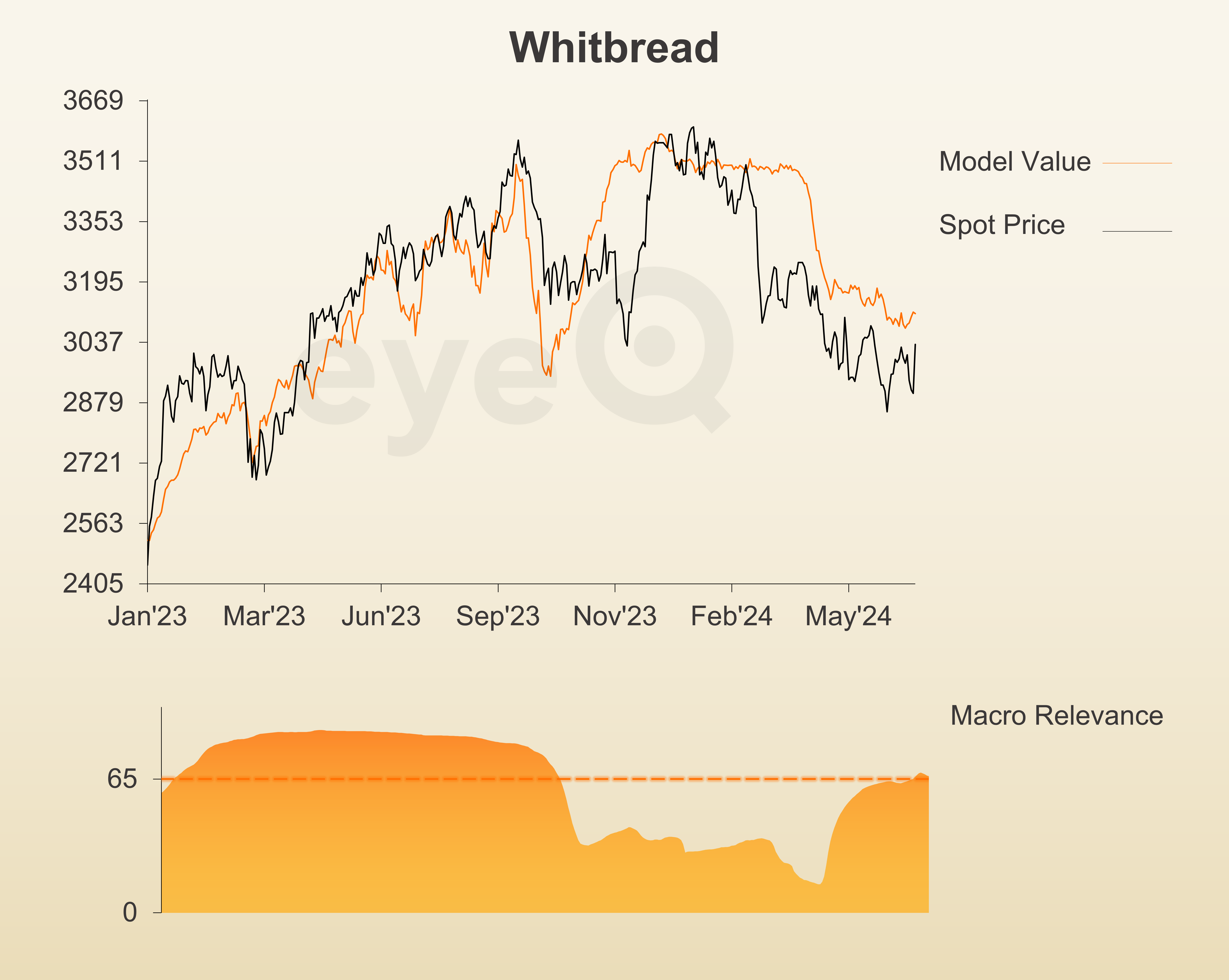eyeQ: data tipped to give this FTSE 100 share an extra boost
interactive investor has teamed up with the experts at eyeQ who use artificial intelligence and their own smart machine to analyse macro conditions and generate actionable trading signals. This time it analyses a cheap blue-chip.
18th June 2024 10:19
by Huw Roberts from eyeQ

"Our signals are crafted through macro-valuation, trend analysis, and meticulous back-testing. This combination ensures a comprehensive evaluation of an asset's value, market conditions, and historical performance." eyeQ
- Discover: eyeQ analysis explained | eyeQ: our smart machine in action | Glossary
Whitbread
Trading signal: long-term strategic model
Model value: 3,111.69p
Fair Value Gap: -2.65% discount to model value
Model relevance: 66%
Data correct as at 18 June 2024. Please click glossary for explanation of terms.
A big theme in 2023 was “revenge travel” – the idea that, after lockdown, consumers were prioritising spending their money on experiences, ie. travel, holidays and concerts.
Here in the UK, Taylor Swift’s Eras tour has landed and several economists have started to incorporate the impact of hundreds of thousands of Swifties spending on tickets, merchandise and hotels on local economies. One projection said her recent Edinburgh shows injected around £77 million into the Scottish economy.
This morning, Whitbread (LSE:WTB), who own Premier Inns plus restaurant chains such as Beefeater and Brewers Fayre, delivered a trading update. The news was mixed – sales growth was flat, restaurant traffic weaker, hotel business robust on the whole but with some caveats – but the initial market reaction has focused on the positive, with the stock up around 3.5%.
That could be anticipation of a decent summer between the Swifties, Euro 2024 fans and people off to Paris to watch the Olympics.
But it could also reflect the fact the stock was cheap to macro conditions. Whitbread started the week 7.3% cheap to eyeQ’s model, which was just enough to trigger a bullish signal. This morning’s rally has already closed some of that gap but the stocks still sits around 2.7% cheap to the broad macro environment.
On eyeQ, Whitbread wants well-behaved inflation and the Bank of England to ease monetary policy – both of which will boost consumer spending power. That means this week’s inflation report and Bank of England rate decision will be critical in shaping what model value does next.
For now, it’s flatlining awaiting a new direction. There’s still scope for the market to tactically catch up to where macro says Whitbread should trade. A more strategic investment needs fresh macro impetus from this week’s data.

Source: eyeQ. Past performance is not a guide to future performance.
Useful terminology:
Model value
Where our smart machine calculates that any stock market index, single stock or exchange-traded fund (ETF) should be priced (the fair value) given the overall macroeconomic environment.
Model (macro) relevance
How confident we are in the model value. The higher the number the better! Above 65% means the macro environment is critical, so any valuation signals carry strong weight. Below 65%, we deem that something other than macro is driving the price.
Fair Value Gap (FVG)
The difference between our model value (fair value) and where the price currently is. A positive Fair Value Gap means the security is above the model value, which we refer to as “rich”. A negative FVG means that it's cheap. The bigger the FVG, the bigger the dislocation and therefore a better entry level for trades.
Long Term model
This model looks at share prices over the last 12 months, captures the company’s relationship with growth, inflation, currency shifts, central bank policy etc and calculates our key results - model value, model relevance, Fair Value Gap.
These third-party research articles are provided by eyeQ (Quant Insight). interactive investor does not make any representation as to the completeness, accuracy or timeliness of the information provided, nor do we accept any liability for any losses, costs, liabilities or expenses that may arise directly or indirectly from your use of, or reliance on, the information (except where we have acted negligently, fraudulently or in wilful default in relation to the production or distribution of the information).
The value of your investments may go down as well as up. You may not get back all the money that you invest.
Equity research is provided for information purposes only. Neither eyeQ (Quant Insight) nor interactive investor have considered your personal circumstances, and the information provided should not be considered a personal recommendation. If you are in any doubt as to the action you should take, please consult an authorised financial adviser.
Disclosure
We use a combination of fundamental and technical analysis in forming our view as to the valuation and prospects of an investment. Where relevant we have set out those particular matters we think are important in the above article, but further detail can be found here.
Please note that our article on this investment should not be considered to be a regular publication.
Details of all recommendations issued by ii during the previous 12-month period can be found here.
ii adheres to a strict code of conduct. Contributors may hold shares or have other interests in companies included in these portfolios, which could create a conflict of interests. Contributors intending to write about any financial instruments in which they have an interest are required to disclose such interest to ii and in the article itself. ii will at all times consider whether such interest impairs the objectivity of the recommendation.
In addition, individuals involved in the production of investment articles are subject to a personal account dealing restriction, which prevents them from placing a transaction in the specified instrument(s) for a period before and for five working days after such publication. This is to avoid personal interests conflicting with the interests of the recipients of those investment articles.